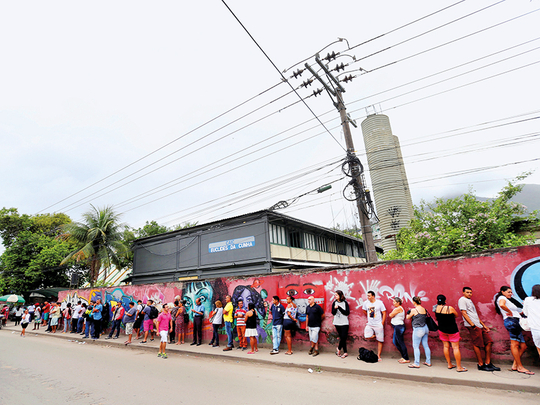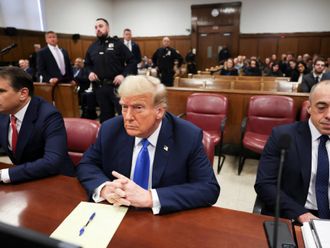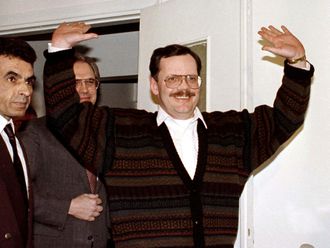
RIO DE JANEIRO
Brazil emerged from the shadow of a military dictatorship more than three decades ago, leaving behind an era stained by torture and extrajudicial killings. Now, this nation is on the cusp of electing a former army captain who has pledged to bring his own brand of iron-fisted rule back into the presidency.
Brazil began voting Sunday in a divisive presidential run-off election whose front-runner, far-right former army captain Jair Bolsonaro, is vowing to rescue the country from crisis with a firm grip. Bolsonaro has tapped into deep anti-establishment anger, but repulsed part of the electorate with his denigrating remarks about women and blacks. He faces leftist Fernando Haddad, a former mayor of Sao Paulo.
Just hours before Brazilians began casting ballots to decide who will next lead the world’s fourth-largest democracy, Bolsonaro saw his lead slip over his leftist rival. The Ibope poll showed Bolsonaro had 54 per cent of voter support, compared with Haddad’s 46 per cent — a fall of 3 percentage points for Bolsonaro compared to the same poll published on Tuesday. A second poll done by the Datfolha group showed Bolsonaro with 55 percent and Haddad with 45 percent, a fall of 1 percentage point for Bolsonaro, compared with the same poll published on Thursday.
CRIME: The centerpiece of his campaign has been his promise to reduce Brazil's high crime rate. Latin America's largest country is the world leader in total number of homicides. Last year, a record 63,880 people were slain. Many Brazilians live in daily fear of muggings and burglaries. He also wants to lower the age at which defendants can be tried as adults to 16.
ECONOMY: His choice of an economist who studied at the University of Chicago as an adviser won over much of Brazil’s business community. He has promised to cut the size of the government, and to pursue pension reform that will likely cut at least some benefits. He also wants to privatise many state companies.
ECONOMY: Haddad has put the suffering of Brazilians during a protracted recession at the centre of his campaign. Much of his platform centres on reversing what President Temer has done, including removing a government spending cap and scrapping a law that made labour rules more flexible and reduced benefits.
SOCIAL PROGRAMMES: Haddad has promised to put social and economic inclusion at the heart of his agenda, vowing to reduce the inequalities that have long pushed vast swathes of Brazilian society to the margins. He has promised to overhaul the education system, to expand the public health system and to increase the allowance of a popular welfare programme
Sources: G1, Reuters Graphic News/©Gulf News
But Bolsonaro, 63, has waxed poetic about the generals who led Brazil from 1964 to 1985 — their biggest flaw, he argues, is that they didn’t kill enough dissidents. If he wins, he has vowed to stock his cabinet with retired officers, throw leftists in jail, outlaw land rights groups, weed liberal thought from schools and encourage police to use lethal force.
An iron fist, though, is exactly what some Brazilians seem to want. Confronting runaway crime, a sluggish economy and enormous political corruption, almost a third of voters, polls show, have grown nostalgic for the dictatorship. They portray it as a period of law and order when Latin America’s largest nation thrived.
At a rally in Rio de Janeiro on Sunday, Bolsonaro supporters wildly cheered a passing vehicle carrying heavily armed soldiers — part of an offensive to pacify this violent city’s slums. “Woo-hoo! Let’s go boys! Get them!” yelled one woman, wearing a T-shirt portraying Bolsonaro as Francis Ford Coppola’s Godfather.
“It really is frustrating, man,” the Brazilian singer Geraldo Azevedo, who was imprisoned and tortured for 41 days during the dictatorship, told the audience during a performance last weekend. “ I was jailed twice during the dictatorship, I was tortured. You don’t know what torture is. All this joy you’re feeling now will disappear, you know that? Brazil is going to become awful if this man wins.”
In 1999, Bolsonaro — then a fringe lawmaker — delivered a fiery speech in which he pledged, if he ever became president, to call on the military to take control of the nation on “Day One.” He has since walked back those words — and pledged frequently in the past few months to uphold democracy.
But his son and adviser — the lawmaker Eduardo Bolsonaro — recently suggested that soldiers could shut down the supreme court if there were any attempts to prevent his father from taking office. Jair Bolsonaro won a first round of voting earlier this month and is now polling ahead of his leftist challenger, Fernando Haddad, by 12 percentage points as they go into the runoff this weekend. Speaking at a rally in Sao Paulo last Sunday, the candidate unleashed a litany of threats.
He vowed that Luiz Inacio Lula da Silva, Brazil’s former leftist president, who is serving a 12-year sentence on corruption charges, would “rot in jail.” Haddad, Bolsonaro suggested, may join him behind bars. He threatened to declare the Landless Workers’ Movement — a massive social movement known for run-ins with large land owners — a terrorist organisation. He declared open season on leftists.
“Either they go overseas, or they go to jail,” Bolsonaro said. “These red outlaws will be banished from our homeland. It will be a cleanup the likes of which has never been seen in Brazilian history.”
From the beginning, Bolsonaro’s candidacy has been steeped in militarism. His running mate, Hamilton Mourao, is a retired four-star general infamous for his criticism of democracy. Last year, at a speech in Brasilia, Bolsonaro lamented the state of Brazilian democracy, saying, “When we look with fear and sadness at what is happening, we say, ‘Why don’t we just tear this thing down.’ “
If he wins, Bolsonaro is expected to appoint military men to head the ministries of defence, infrastructure and education. Those ministries have a combined budget of $66 billion (Dh242.2 billion), or a fifth of the government’s overall spending.
For education minister, analysts expect Bolsonaro to tap retired General Alessio Souto, who has defended “military intervention” to “put democracy back on an appropriate track.” He is expected to aggressively push Bolsonaro’s plan for “no party” schools — a programme that would effectively ban teachers from espousing political views in classrooms.
“It basically serves as a right-wing ideological patrol, because they’ve come up with this narrative that teachers and professors in Brazil are always trying to indoctrinate children as leftists,” said Guilherme Casares, a comparative politics professor at the Getulio Vargas Foundation, a university in Sao Paulo.
Brazil’s right-wing dictatorship was notably less murderous than those in neighbouring Argentina and Chile. Nevertheless, at least 434 people were killed or “disappeared” while the military was in charge. Torture techniques included holding mock crucifixions of dissidents.
Unlike some other regimes in Latin America, Brazil’s military rulers attempted to keep up a veneer of democracy after taking over in 1964. The presidency rotated among a cast of generals, and Congress remained open, though largely operated as a rubber stamp. Elections were rigged, and most political parties were abolished.
The dictatorship led to higher levels of economic inequality, as workers’ rights declined, the minimum wage remained low and salaries rose for the top layer of society. Corruption was rampant, but press censorship meant the public rarely found out about scandals. Speaking out about wrongdoing could lead to prison, torture and death.
“Bolsonaro is selling the idea that there was no corruption under the regime. But there was corruption, and a lot of it, just none that the press could denounce,” said Jorge Ferreira, a historian who has written books on the dictatorship.
Critics fear Bolsonaro would call on the generals for support in the event of a constitutional crisis or attempted impeachment. But it is not clear whether they would answer. Experts say the institution has matured since the military left power in 1985 — and its leaders have little interest in political intervention. “I think the analysts who say Brazil will have a coup under Bolsonaro are doing their analysis out of Washington offices,” said Lucas de Arago, director of Arko Advice, a political-risk company in Brasilia. “That’s not going to happen. The military in Brazil no longer has an agenda of power.”
The military remains one of the country’s most respected institutions. About 78 per cent of Brazilians trust the armed forces, compared with 31 per cent who feel the same way about Congress. “While Brazilian politics fell into moral ruin, the military remained on the outside, they didn’t engage, and conquered the highest levels of prestige and confidence of the people. All this has benefited Bolsonaro as a candidate,” said Paulo Chagas, a retired Brazilian army general and politician.












